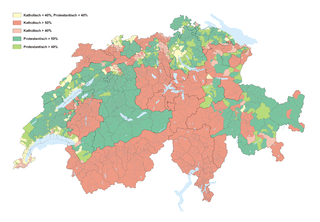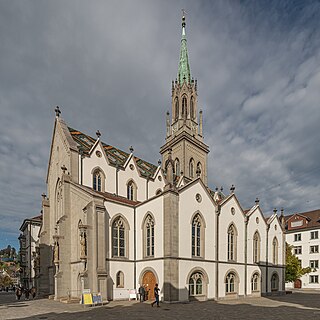Related Research Articles

A united church, also called a uniting church, is a denomination formed from the merger or other form of church union of two or more different Protestant Christian denominations, a number of which come from separate and distinct denominational orientations or traditions. Multi-denominationalism, or a multi-denominational church or organization, is a congregation or organization that is affiliated with two or more Christian denominations, whether they be part of the same tradition or from separate and distinct traditions.
The United Church in Jamaica and the Cayman Islands is a united church formed on 1 December 1965 as the "United Church of Jamaica and Grand Cayman" by bringing the Protestant denominations "Presbyterian Church in Jamaica" and "Congregational Union of Jamaica" together. The "Disciples of Christ in Jamaica" joined on 13 December 1992, at which time the current name was adopted.

The Reformed branch of Protestantism in Switzerland was started in Zürich by Huldrych Zwingli and spread within a few years to Basel, Bern, St. Gallen,(Joachim Vadian), to cities in southern Germany and via Alsace to France.

The Protestant Church in Switzerland (PCS), formerly named Federation of Swiss Protestant Churches until 31 December 2019, is a federation of 25 member churches – 24 cantonal churches and the Evangelical-Methodist Church of Switzerland. The PCS is not a church in a theological understanding, because every member is independent with its own theological and formal organisation. It serves as a legal umbrella before the federal government and represents the church in international relations. Except for the Evangelical-Methodist Church, which covers all of Switzerland, the member churches are restricted to a certain territory.

The Union of Welsh Independents is a Reformed Congregationalist denomination in Wales.

Lukas Vischer was a Swiss Reformed Theologian. From 1961 he was Research Secretary of the World Council of Churches’ (WCC) Faith and Order Commission in Geneva and from 1966 until 1979 the Commission’s Director. From 1980 until 1992 he headed the Protestant Office for Ecumenism in Switzerland and taught Ecumenical Theology at the Theological Faculty of the University of Bern. From 1982 until 1989 he was moderator of the World Alliance of Reformed Churches’ (WARC) Theology department and from 1982 until 2008 moderator of the John Knox International Reformed Centre’s Programme Commission in Geneva. In these years, ecological responsibility of the Churches became a focal point of his work.
The Reformed Presbyterian Church of Equatorial Guinea is a minority church in Equatorial Guinea. It is reformed by its theology and presbyterian by its form of government, as stated in its constitution. The principal religion in Equatorial Guinea is Christianity, with approximately 85-93% of the population as followers. Most Christians belong to the Roman Catholic Church (80-87%) while a minority are Protestants (5-7%). Another 5% of the population follow indigenous beliefs, 2% are Muslims, followers of Baha'i and other beliefs.
The Evangelical Christian Church in Halmahera (GMIH) represents the half of the population in the island of Halmahera, in Indonesia.
The Christian Evangelical Church in Minahasa is a Protestant, Calvinist and Reformed church in Indonesia. It was founded in North Sulawesi on 30 September 1934.

The Protestant Christian Church in Bali is a Reformed denomination established in 1931 in Bali, Indonesia by the Christian and Missionary Alliance with help from the Dutch Reformed Church and the Church in East Java. The denomination adopted its current name on 21 April 1949. There are also churches located in Hamburg, Germany, Bern and Amsterdam.
The Pasundan Christian Church was officially established in Indonesia on 14 November 1934. It has 51 congregations and 33,000 members. It is a member of the World Communion of Reformed Churches (WCRC).
The African Protestant Church was established by American Presbyterian missionaries in Cameroon. In 1921 the mission opened a Bible School, the Dager School of Theology, to train African leaders of the church. In 1934 a group was separated from this body. After several name changes it adopted the name Africa Protestant Church. Originally it has concentrated in the Lolodorf region, but spread other parts of the country. In 2006 it had 10,000 members and 32 congregations. It has the School of Theology Abraham Nzie Nzouango to train pastors and church officers. It is a member of the World Communion of Reformed Churches and the World Council of Churches.
The Spanish Evangelical Church is a united denomination; Presbyterians, Methodists, Lutherans, Congregationalists participated in the merger. It was established in the wake of religious tolerance in Spain in 1869. The first General Assembly was in Seville in 1872, where the name of the Spanish Christian Church was adopted, later changed to the current name.

The National Evangelical Synod of Syria and Lebanon (NESSL), also known as Synod SL, is a Reformed denomination in the Middle East. It is a federation of Arabic-speaking congregations, that trace back their origin to the evangelical revival in the 19th century. These churches adopted Reformed theology and Presbyterian church government. This Reformed revival was supported by many Reformed churches in the United States. The Ottoman authorities recognised the Protestant faith in 1848, the first congregations were founded in Beirut, Hasbaya. Later congregations were established in the major cities. The Synod was organised in 1920 with several Presbyteries. There has been a steady growth in new members in recent years.
The Evangelical Reformed Church of the Canton of Lucerne, or in German the Evangelisch-Reformierte Kirche des Kantons Luzern, is a Reformed state church in the Canton of Lucerne, Switzerland.
The Evangelical Reformed Church of the Canton of Vaud is a Reformed cantonal state church in Vaud.

The Evangelical-Reformed Church of the Canton of St. Gallen is a Reformed state cantonal church in the canton of St. Gallen.
The Evangelical-Reformed Church of Appenzell is a Reformed state church in Appenzell, Switzerland. In 2004 it had 30,151 members and 20 parishes and 26 house fellowships, served by 21 pastors. Member of the Federation of Swiss Protestant Churches. The church can be found all over Appenzell. Women ordination is allowed.
The Evangelical Free Church of Geneva is a Reformed free church in Geneva, Switzerland. The church has 6 congregations in Onex, Versoix, Buix, Rive Droite, Carouge, l'Oratoire with a combined membership of 1,000.
References
- ↑ www.reformiert-online.net/adressen/detail.php?id=13313&lg=eng
- ↑ www.ref-sh.ch/kontakt
- ↑ www.oikoumene.org/en/member-churches/europe/switzerland
- ↑ "www.oikoumene.org/en/member-churches/federation-of-swiss-protestant-churches". Archived from the original on 2017-08-14. Retrieved 2014-04-17.
- ↑ www.ref-sh.ch/?page=kirchgemeinden
- ↑ Entwurf zur Kirchenordnung der Evangelisch-reformierten Kirche des Kantons Schaffhausen, Art. 41 (PDF; 168 kB) (German)